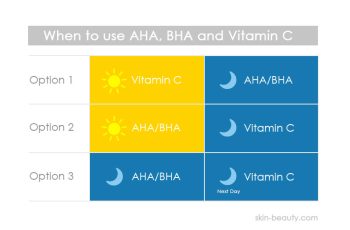
Can BHAs be used with retinol?
It’s completely normal to feel a bit like a mad scientist when using skincare. If you’ve been in this space for a while, you’ll probably be more confident about which ingredients work together. But if you’re new, don’t worry because today we’re going to cover whether or not you can use BHAs with retinol.
Let’s quickly review the benefits you can expect from using BHAs and retinol in your daily skincare routine.
What is a BHA?
The most commonly used BHA, also known as beta hydroxy acid, is salicylic acid, which is derived from willow bark. Many people with oily and blemish-prone skin love it because it removes dead skin cells, dirt, bacteria, and debris from the surface of the skin. It’s also one of the smallest acids in molecular size and is oil-soluble, which means it can penetrate deep into the pores to remove excess sebum or impurities that can cause skin blemishes like blackheads and acne. Due to the high efficacy of this chemical peel, it’s best used with moisturizing and nourishing ingredients like hyaluronic acid. If you want to learn more about BHAs, especially salicylic acid, check out The Beauty Insiders’ blog post on their benefits.
What is Retinol?
One of the most effective and widely used ingredients in skin care, it’s a favorite among experts. Also known as Vitamin A, one of its main benefits is its ability to boost skin cell turnover. This helps improve fine lines, wrinkles, uneven skin texture, dark spots, and breakouts. As you can see, retinol is a very versatile ingredient, but it’s also known to cause dryness and short-term side effects like itchy, flaking skin. That’s why you need to introduce retinol into your daily routine slowly and correctly to avoid severe irritation and possible damage. For more information on retinol and its skincare benefits, check out the blog.
Can Salicylic Acid Be Used with Retinol?
The short answer is yes, but make sure you use it correctly. You should avoid layering these two powerhouses because they don’t blend well with each other. But that doesn’t mean you don’t have to use them in your daily routine, just use them at the best time of day.
Many skin care experts recommend using products like toner or cleanser with salicylic acid in your morning routine. Just make sure you finish your daily sunscreen routine. You can then continue to use your retinol product at night, also because retinol is known to lose its effectiveness when exposed to the sun.
If you want to use salicylic acid at night, you can, but you just need to think about it a little more to avoid adverse reactions. Ideally, you should wait at least 30 minutes between each application to allow the skin’s surface pH to balance and prepare for the next step in your skincare regimen.
Can I exfoliate with retinol?
No, it is best to avoid exfoliation when using retinol. The additional chemical and physical exfoliation of the skin, followed by the use of retinol, strips the skin of its oils. Once the skin has experienced this deprivation, it panics and starts overproducing sebum (the skin’s natural oil). Excessive sebum can cause acne breakouts and lead to an imbalance in your skin type.
Fortunately, it is recommended to use retinol every other night, so you can exfoliate on the nights when you don’t use retinol. However, I still recommend consulting your doctor or dermatologist before using new ingredients and products in your daily routine to avoid any adverse reactions.
Can salicylic acid and retinol be used on the same day?
Yes, you can, but remember to plan the application carefully. As I mentioned before, you should alternate between the two ingredients to get the benefits of using both. Since retinol should not be used during the day, consider using a cleanser or toner with salicylic acid in your morning skincare routine.
Pay attention to how your skin feels. If dryness or irritation occurs and a hyaluronic acid serum doesn’t provide relief it’s best to seek advice from a trained professional or medical professional.
What Not to Mix with Salicylic Acid?
There are many skincare ingredients that should not be mixed with salicylic acid, such as: b.
Glycolic Acid
Lactic Acid
Benzoyl Peroxide
Retinol/Retinoids
Tretinoin
Vitamin C
Just to clarify what I mentioned before: Not being able to mix any of these ingredients with salicylic acid doesn’t mean you shouldn’t use them in your daily routine. If you leave at least 30 minutes between applications or use them at different times of the day, you’ll reap the rewards.
Which is Better, Retinol or Salicylic Acid?
Both ingredients are impressive and effective in fighting blemishes and breakouts, but at the same time they work on the skin in slightly different ways. You’ll find that both reach the lower layers of the epidermis, with retinol boosting collagen and elastin production, while salicylic acid fights clogged pores.
If you want to fight the signs of aging, retinol is the best ingredient to fight all of them. For all the issues related to acne and pimples, salicylic acid can easily get rid of pimples and the bacteria that cause them. Deciding which ingredient you prefer and which one is better for your skin depends on your personal preferences and the skin issues you want to treat.
That’s it, hopefully you now know a little more about whether you can use BHA with retinol. If you have any further questions, don’t forget to follow us on Instagram!


